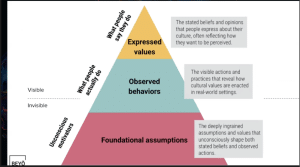Day 2–Global insights: Embracing international and intercultural research for innovation

— Thank you and once was interviewing people in Philippines to understand local context when applying for job
- Explained context of interview and end introductions with any questions for me
— This Filipino family asked to figure out how old she was, and not common for people to ask specific personal questions in professional context
- Was fine, as knowing why asking the question, and how to address with terms for when younger or older
— Important to figure out what drives behavior

— Helping companies across org, navigate global complexities for global crowth
- Grabbing local culture or context, is key for global expanaison or growth

— Cultural data was make or break for successful market expansion

— Not grasping market is reason why certain companies have to leave certain markets
- While Starbucks had to close stories in Australia, Sephora in South Korea
- Wal-Mart in Germany

— Example of Sephora’s failure in South Korea
- Sales approach and in-store experts and production issues and South Korea interested in self-exploration
- Disconnect between product offering, with South Korea consumers prioritizing skincare over make-ups
- Sephora missed the point and aligned with preference of locals
— Expand into new market and grasp local context and behaviors and whole ecosystem before you dive in

— What is culture though?
- We use it a lot, but what do we mean?
— Culture depends on different contexts
- Shared value and beliefs that share how people work together in corporate org
- Sub-culture of unique identity like gamers or skateboarders and best way to illutrate this
— Deeply embedded in daily life and around us

— Avoid using term of localization of adapting business to local culture, often misinterpreted and translating into local language
- Localization is often surface level implementation
- Culturalization goes deep into ongoing process and changes of whole ecosystem of countries and connecting product to services at cultural level

— Example of culturalization include things like aligning currency and payment methods
— Deeper level to help standout from crowd and market, and grasping values and beliefs of social norms, and economy station

— Think IKEA in India, and understanding how people lived in social context, and problems and challenges they faced
- Could change currency and language, but not sufficient
— Made local adaptation for countertop cabintes for lower heights as Indians are shorter compared to Western Europeans and product line and local taste and liviing context
- Cafeteria aligned with Indian tastes and 1,000 available seats for dining areas and leisurely dining area

— All aspects of ecosystem impacted for culturalization, and takes whole org to have collective effort within all teams
- Cross-cultural insights will play important role
— Influences data and final decisions, campaigns to do

— For cultural insights need to go one level deeper to grasp deeper motivations

— In Phillipines, I have been to sari-sari convenience stores, where they are selling stuff in sachets with things like shampoo, hair conditioners
- Example of Tingi culture and adaptability when capital is limited and cooking oil by cup and garlic spice cloves
— Even wealthier consumer still buy sachet, as embedded behavior and cultural impact of poverty of colonial system
— Why important to have insights?
- You might think for digital subscription services it doesn’t matter, but understand root of culture and how it to apply for business
- Spotify had monthly subscription payment model that paid by month
- But Tingi culture showed smaller subscription and payment period. Mini-plan is small but driver can find so-what factors to inform what you can do to better serve customers in business context
- Spotify had monthly subscription payment model that paid by month

— Culture is not actual expressed values, but observed behavior, and deep assumptions

— Makes it much more complex and translator means home country and more to do it and get more full conetxt and nuances of what works
- Domain and industry
— Not relevant to finances or financial services, but also to interest what things are there
- More skills than basic services

— Many methods for this from user interviews to ethnography for cross-cultural research and digital tech company for how Kenya and Rwanda for medical professionals

— Participatory immersion and joined activities and understanding how Kpop super-fans to grasp how they did this, and easy to interact with emotions they have and interacting with them
- Important to feel emotional needs people are going through and excitement for how things work
— Embrace world you have in front of you and local stores, and walking around and feeling overwhelmed and locals to understand how people live
- You can also leverage tools like diary study
- Check to with stakeholder to figure out what you already know, and if secondary desk resarch or synthesis works
— Four buckets exercise to align with stakeholders, which we can find in book

— Once you have scope defined, complexity of preparing research

— Hurdles included
- Arriving late for Kenyans and 1.5 hour delay towards time in Kenya and stressed out and didn’t want to appear rude, and time in different ways
- Qatar not turning up despite incentive, as money was unattractive, but status and perception was— showing private tour for resorts like marble sheikh palace

— Many things for importance of global research

— Write out a plan and brief for cultural input

— Cultural considerations like Ramadan

— Thinking of target audiences, and how to get proper languages and 250 ethnic groups and how to think about group

— Tons of checklist in book

— Best adaptations feel seamlessly into org, and people don’t notice and remember

— Some final tips, and understand

— For fascinating on insights for same culture, take a look at my book “Research for Global Growth”

